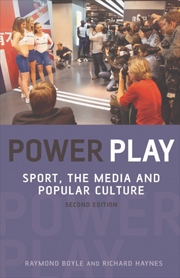Book contents
- Frontmatter
- Contents
- Miscellaneous Frontmatter
- Preface
- Acknowledgements
- 1 Sport, the Media and Popular Culture
- 2 All Our Yesterdays: A History of Media Sport
- 3 A Sporting Triangle: Television, Sport and Sponsorship
- 4 Power Game: Why Sport Matters to Television
- 5 Who Wants to Be a Millionaire? Media Sport and Stardom
- 6 The Race Game: Media Sport, Race and Ethnicity
- 7 Playing the Game: Media Sport and Gender
- 8 Games Across Frontiers: Mediated Sport and National Identity
- 9 The Sports Pages: Journalism and Sport
- 10 Consuming Sport: Fans, Fandom and the Audience
- 11 Conclusion: Sport in the Digital Age
- Bibliography
- Index
10 - Consuming Sport: Fans, Fandom and the Audience
Published online by Cambridge University Press: 05 August 2013
- Frontmatter
- Contents
- Miscellaneous Frontmatter
- Preface
- Acknowledgements
- 1 Sport, the Media and Popular Culture
- 2 All Our Yesterdays: A History of Media Sport
- 3 A Sporting Triangle: Television, Sport and Sponsorship
- 4 Power Game: Why Sport Matters to Television
- 5 Who Wants to Be a Millionaire? Media Sport and Stardom
- 6 The Race Game: Media Sport, Race and Ethnicity
- 7 Playing the Game: Media Sport and Gender
- 8 Games Across Frontiers: Mediated Sport and National Identity
- 9 The Sports Pages: Journalism and Sport
- 10 Consuming Sport: Fans, Fandom and the Audience
- 11 Conclusion: Sport in the Digital Age
- Bibliography
- Index
Summary
The [Manchester] City takeover reminds us of this truth: the game may have originated here, but, even as it grows richer, it has become a pursuit in which its inventors are increasingly marginalized. We don't own the clubs and we don't play for them. We are merely spectators.
(White, 2008)Introduction
Being a sports fan has become an expensive passion. Much of our attention in this book has focused on the history, political economy and textual analysis of media sport. However, central to both the media and sporting industries is, of course, the fan and/or reader/viewer, the people who consume sport, either in its relatively raw form or in its increasingly mediated form. Part of what we want to do in this chapter is to examine the consumption of mediated sport and attempt to develop an empirically grounded theory of audiences for televised sport. In the latter part of the book we have also been interested in the relationship between sport, media and identity formation. To this end it is also worth saying something about how fandom relates to this process and to re-emphasize the extent to which the media are not the sole agents shaping the process of identity formation among fans and other collectivities.
- Type
- Chapter
- Information
- Power PlaySport, the Media and Popular Culture, pp. 184 - 203Publisher: Edinburgh University PressPrint publication year: 2009



